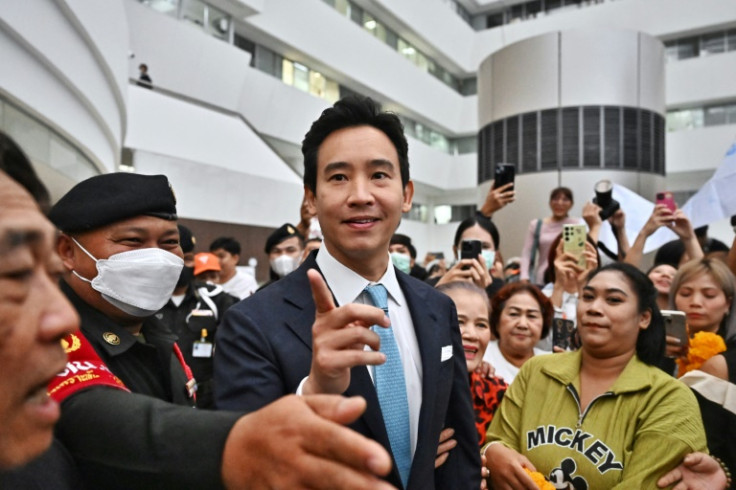
Thwarted Thai prime minister candidate Pita Limjaroenrat whose party won the most seats in the last election will face a court ruling on Wednesday that could see the popular reformist disqualified as an MP.
The 43-year-old led the progressive Move Forward Party (MFP) to win the most votes in last year's election, but was blocked from becoming prime minister after he was suspended as an MP in July.
His party was excluded from the governing coalition after the powerful establishment was spooked by the MFP's calls to reform the kingdom's strict royal insult laws, the military and business monopolies.
The Constitutional Court will consider on Wednesday whether Pita broke rules banning members of parliament from owning shares in media companies. He is currently barred from participating in the legislature and entering the parliamentary chamber.
The media-savvy politician has insisted he will run for office again -- but if the court rules against him, he faces disqualification from parliament altogether.
Submitting evidence for the case in December, Pita told reporters outside court he was "confident" he would receive justice.
He reiterated in an interview with AFP late last year that he would take another tilt at the premiership, saying he was "not giving up".
The Constitutional Court case revolves around shares in the long-defunct ITV television station, which Pita says he inherited from his father when he died. He has denied any wrongdoing.
Following the verdict, the Election Commission could refer Pita to the Supreme Court under a new charge where he could face a jail term of up to 10 years, as well as a political ban.
Pita's case bears similarities to a 2019 case, when popular progressive Thai politician Thanathorn Juangroongruangkit was disqualified as an MP for holding media shares.
Thanathorn's Future Forward party, the predecessor of the MFP, was later dissolved by the courts in a separate case which led to massive pro-democracy demonstrations.
During the 2023 election campaign, Pita re-energised young and urban Thais exhausted after the dwindling protest movement and weary of a near-decade of military rule.
Mostly written off by commentators, the MFP surprised the establishment when they beat the Pheu Thai party of veteran political playmaker and former premier Thaksin Shinawatra into second place in May.
MFP's pledges to reform Thailand's strict royal insult laws, as well as plans to break up business monopolies and take on the military's influence in politics, spurred the kingdom's elites into action behind the scenes.
Pita was blocked by senators -- appointed by the last junta -- from becoming prime minister, and Pheu Thai formed a coalition that included pro-military parties but shut the MFP out of government.
Educated in Thailand and at Harvard, the former Grab executive was drawn into politics in 2018 when he joined Future Forward. He stepped down as MFP leader in September.
Another challenge looms for his former party next week when the Constitutional Court will consider a petition arguing that the MFP's pledge to reform lese-majeste laws amounted to an attempt to overthrow the democratic government with the king as a head of state.






